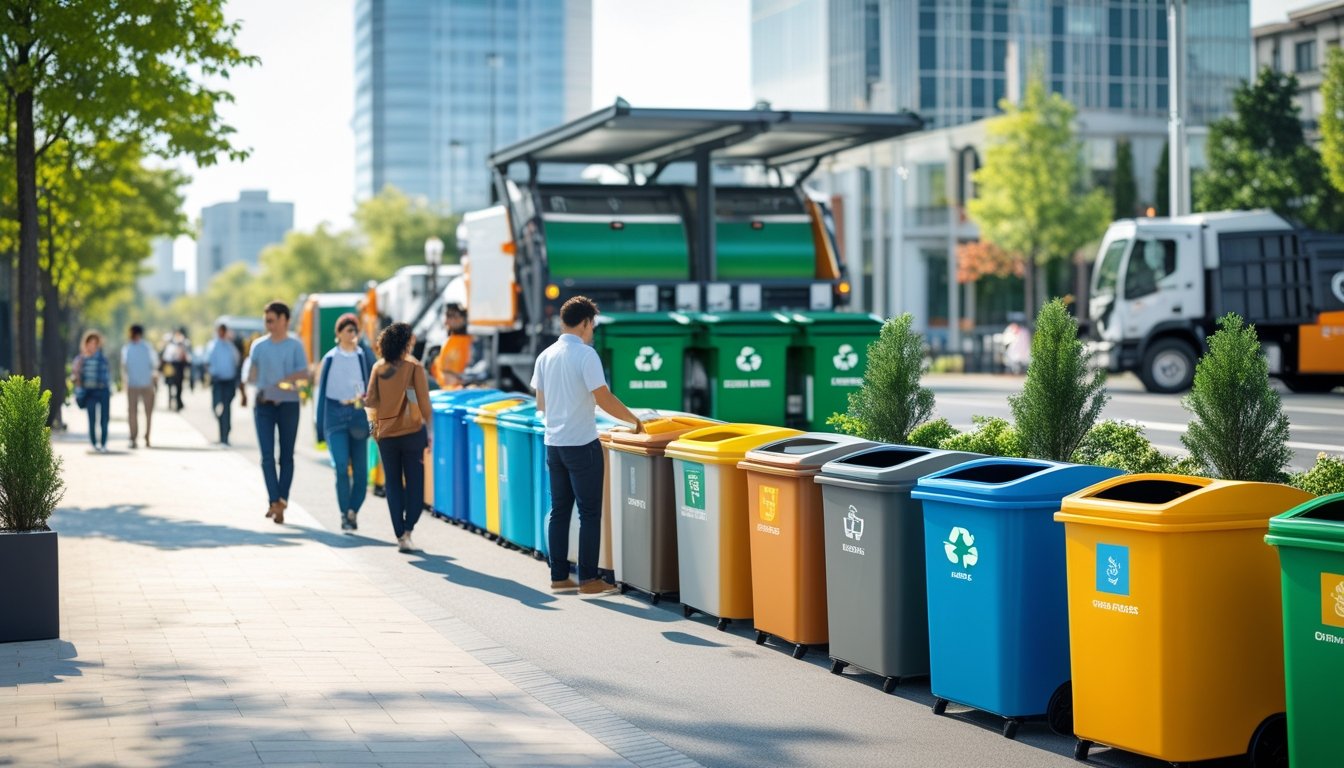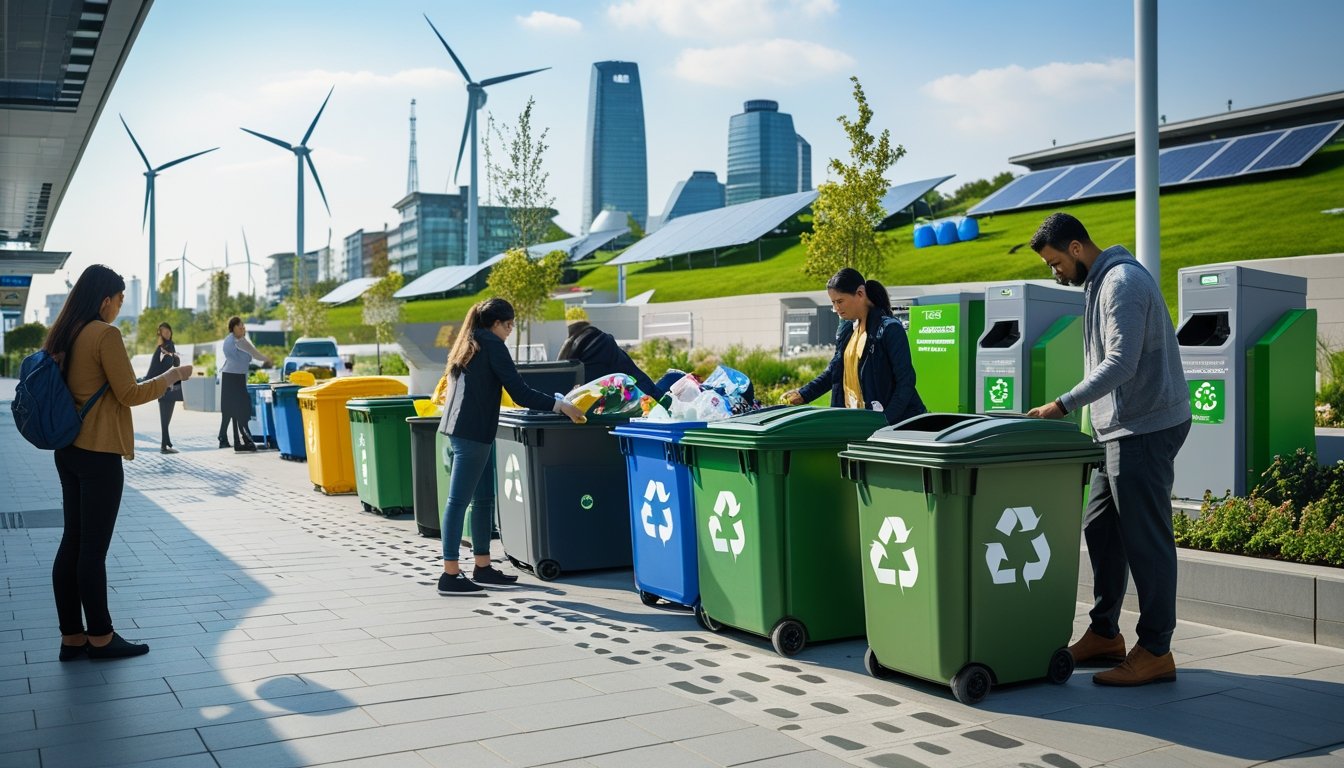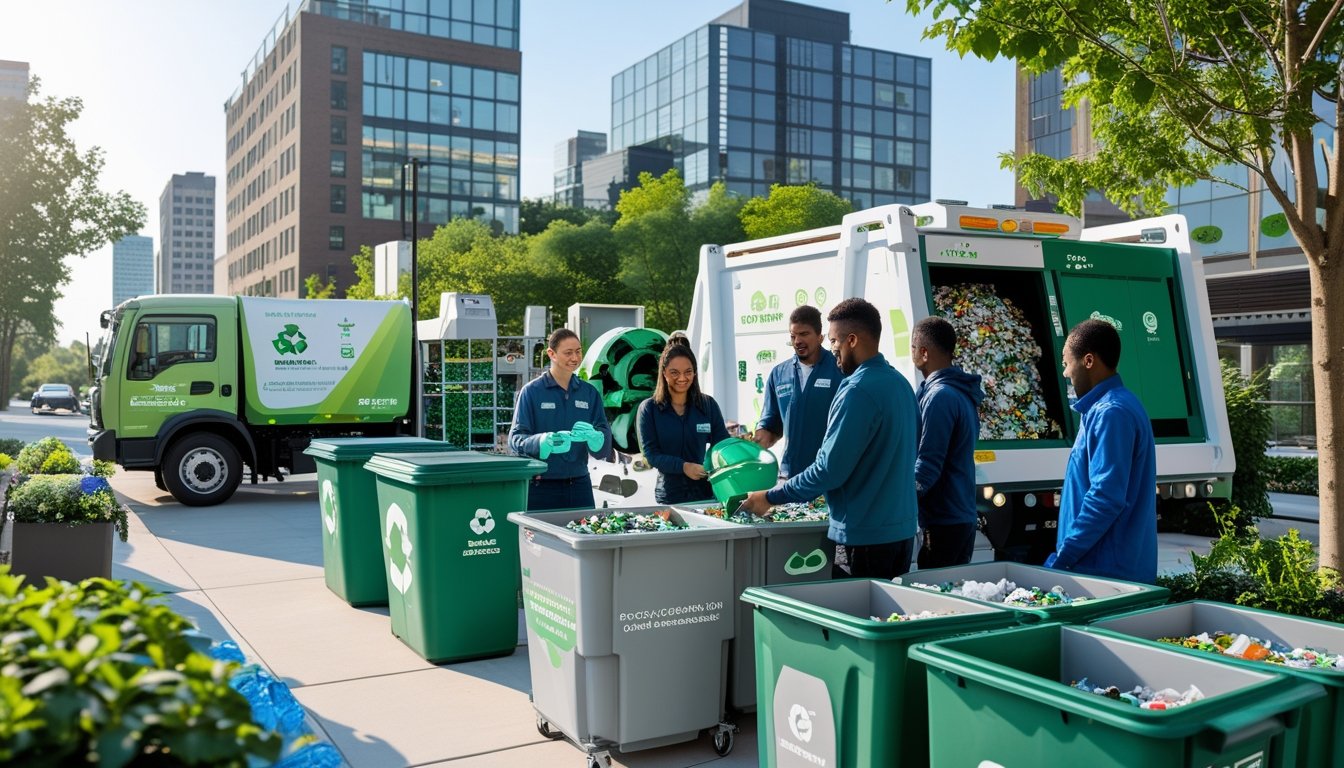Late updated: 14 Jun 2025 12:06
Written by: Sarah Hollister
Eco-Friendly Waste Management Innovations for Cities: Transforming Urban Sustainability
Exploring the realm of eco-friendly waste management innovations for cities reveals an intriguing shift towards sustainability and technology. As urban areas grow, so do the challenges associated with waste. Smart waste management technologies offer an intelligent solution that not only increases efficiency but also enhances our cities' environmental profile. The integration of advanced systems, such as smart waste containers and waste-to-energy processes, is revolutionising the way cities handle waste.

Our cities are evolving into more sustainable environments by readily adopting these innovative waste management strategies. Implementing universal collection systems, focusing on recycling, and employing waste treatment methods are some of the notable efforts. Through these actions, cities can significantly lower their greenhouse gas emissions, thus contributing to a healthier planet.
Many municipalities are actively incorporating these innovations into their urban planning. By investing in state-of-the-art technologies and adopting best practices, they are not only tackling waste management issues but also fostering resilience against environmental challenges. This drives us to ponder what role technology and innovation will continue to play in crafting more sustainable cities.
Key Takeaways
- Smart waste management technologies enhance efficiency and sustainability.
- Cities are adopting universal waste collection and recycling.
- Waste innovations help reduce greenhouse gas emissions.
Key Innovations in Eco-Friendly Urban Waste Management
Innovation is key in urban waste management as cities strive for sustainability. By focusing on smart technologies, waste-to-energy methods, and circular economy models, urban areas can reduce waste and pollution significantly.
Smart Technologies and Artificial Intelligence
Harnessing smart technologies and artificial intelligence (AI) transforms waste management in cities. IoT-enabled devices offer real-time data collection, allowing us to optimise waste collection routes and reduce unnecessary trips. This approach saves fuel, thus cutting down greenhouse gas emissions. Through AI algorithms, we can predict waste generation patterns, enabling a more efficient allocation of resources and timely collection strategies.
Smart bins equipped with sensors play a crucial role in urban settings. These bins notify waste collectors when they're full, ensuring timely pickups and preventing overspilling. Such advanced systems not only improve efficiency but also contribute to cleaner urban environments, reducing the overall carbon footprint.
Waste-to-Energy Technologies
Waste-to-energy technologies provide an innovative solution for reducing landfill dependency and generating renewable energy. By converting waste into usable energy, we address both waste management and energy needs. Incineration plants and anaerobic digesters are examples of technologies that transform urban waste into electricity or heat.
These technologies help reduce emissions by decreasing landfill use and consequently methane release. Furthermore, waste-to-energy facilities can be integrated with existing urban infrastructure. Such integration supports energy efficiency, offering a dual benefit of waste reduction and energy generation. By utilising waste effectively, cities can become more resilient to climate change impacts.
Circular Economy Models
Implementing circular economy models in urban areas enables sustainable waste management through resource circulation. By designing products for longevity and reusability, we minimise waste generation. Recycling materials play a key role, allowing recovered resources to re-enter the production cycle.
Encouraging urban populations to participate in recycling and reuse can significantly reduce pollution and conserve natural resources. Policies supporting Extended Producer Responsibility (EPR) programmes urge manufacturers to consider the end-of-life impact of their products. This approach reduces resource consumption and fosters sustainable urban development. Through a collaborative effort, cities can transition towards becoming circular cities, leading to a more environmentally friendly urban future.
Enabling Sustainable Waste Management in Cities

We are exploring innovative strategies to advance sustainable waste management in urban settings. From adopting renewable energy solutions to educating the public and leveraging economic opportunities, each plays a crucial role in creating sustainable and eco-friendly cities.
Integration of Renewable Energy
Integrating renewable energy into waste management systems transforms our approach to urban waste. By utilising sources such as solar and wind energy, cities can power waste processing facilities more sustainably. This shift reduces reliance on fossil fuels, lowering emissions and improving air quality.
Waste-to-energy technologies are instrumental here. These systems convert commercial waste that would otherwise contribute to landfill build-up into usable energy forms. They not only minimise the waste footprint but also generate energy to support urban green spaces, facilitating sustainable development and biodiversity conservation.
Renewable energy integration is a critical move towards achieving cleaner, more sustainable cities.
Public Awareness and Education
Educating citizens about the importance of sustainable waste management empowers communities. Public campaigns and school programmes play an essential role in fostering social equity and promoting environmental consciousness.
We understand that imparting knowledge on recycling, composting, and waste reduction can influence individual behaviour, leading to broader community impacts. Engaging residents through workshops and information sessions enhances their recognition of nature-based solutions in everyday waste handling.
Clear communication can shift societal norms towards a more sustainable urban lifestyle, contributing to water conservation and improved urban biodiversity. An informed populace becomes a proactive participant in maintaining a greener city, one that prioritises health and air quality.
Policy, Investment, and Economic Opportunities
Strategic policies and investments drive economic growth while encouraging sustainable waste management practices. Governments and industries should implement regulations that support innovation in waste management technologies and promote transparency across sectors.
Investments in infrastructure for waste collection and processing amplify economic prosperity. Sustainable transportation solutions, including reduced traffic congestion through efficient transport systems, also form part of this integrated effort.
Economic opportunities abound in creating partnerships with businesses and industries involved in eco-innovations. By aligning trade policies with sustainable goals, cities can enhance their commercial appeal and facilitate a transition to a circular economy.
In conclusion, these elements collectively advance the sustainable waste management agenda in urban areas, fostering a healthier and more sustainable environment for future generations.
Frequently Asked Questions

In recent years, cities worldwide have been integrating innovative technologies and strategies to address waste management challenges sustainably. Advances in smart technology, policy implementation, and innovative company practices are paving the way for improved urban waste management.
What are the latest advancements in urban waste management technologies?
Cities are increasingly adopting AI and robotics to enhance waste sorting. These technologies help in accurately segregating recyclables and reducing contamination. Advanced recycling methods and waste-to-energy technologies are also being employed to convert waste into valuable resources.
How can smart bins contribute to more sustainable waste management in cities?
Smart bins equipped with sensors can monitor waste levels, ensuring timely collection and optimised routes. This reduces the carbon footprint related to waste collection and helps minimise overflowing bins. By analysing data, cities can also better understand waste generation patterns.
What strategies are being implemented to enhance waste management systems in urban areas?
Cities are integrating circular economy principles to reduce waste generation. Urban composting programmes encourage residents to compost organic waste, which decreases landfill dependency. Extended Producer Responsibility (EPR) programmes and collaborative policy frameworks further support these sustainable initiatives.
In what ways are innovative companies transforming waste management practices?
Innovative companies are developing biodegradable materials and advanced recycling processes, which help reduce landfill waste. Some are also creating platforms to promote community engagement and awareness, changing consumer behaviours towards sustainable practices.
What future-oriented waste management ideas are being explored for urban sustainability?
Future sustainability in waste management includes integrating renewable energy sources with waste treatment facilities. Exploring ways to harness waste for biofuels and expanding the use of biodegradable packaging are also on the agenda. Collaboration with tech firms to explore AI-driven resource recovery solutions is another promising area.
How can cities adopt more environmentally friendly approaches to handling waste?
Cities can start by investing in infrastructure that supports recycling and composting. Implementing smart waste management technologies and promoting public awareness campaigns are also essential. Policies encouraging the adoption of sustainable manufacturing and consumption patterns play a significant role in reducing urban waste.
